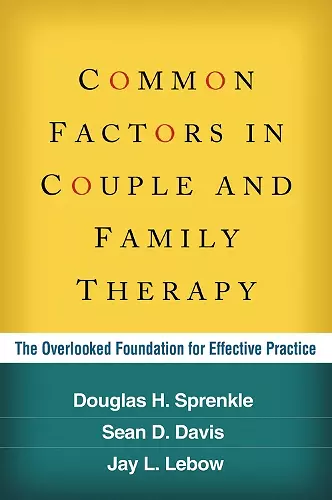Common Factors in Couple and Family Therapy
The Overlooked Foundation for Effective Practice
Jay L Lebow author Douglas H Sprenkle author Sean D Davis author
Format:Hardback
Publisher:Guilford Publications
Published:11th Sep '09
Currently unavailable, our supplier has not provided us a restock date
This hardback is available in another edition too:
- Paperback£30.99(9781462514533)

Grounded in theory, research, and extensive clinical experience, this pragmatic book addresses critical questions of how change occurs in couple and family therapy and how to help clients achieve better results. The authors show that regardless of a clinician’s orientation or favored techniques, there are particular therapist attributes, relationship variables, and other factors that make therapy—specifically, therapy with couples and families—effective. The book explains these common factors in depth and provides hands-on guidance for capitalizing on them in clinical practice and training. User-friendly features include numerous case examples and a reproducible common factors checklist.
''This thought-provoking book offers the reader an outstanding resource for identifying common factors that drive the change process in relational psychotherapies. As the number of available modalities grows with each passing day, students, clinicians, and researchers will find the paradigm presented here to be extremely useful in isolating what is specifically responsible for change and figuring out how to incorporate it into doing what we do best. A 'must read.'"--Frank M. Dattilio, PhD, ABPP, Department of Psychiatry, Harvard Medical School, and Department of Psychiatry, University of Pennsylvania School of Medicine
"A long-awaited, critically important contribution. The authors offer a guidebook for understanding and integrating the common factors that cut across distinct therapies, and also present an extraordinarily thoughtful and nonpolemical examination of the strengths and weaknesses of the common factors strategy. This book will help advanced therapists better understand and sharpen what they do; will help intermediate and beginning-level therapists discover and utilize potent common factors that will enhance their effectiveness; will help theorists cast their ideas in a more generic and universally accessible language; and will help researchers integrate common factors into their hypotheses and research designs. A huge step ahead for our field--read it."--William M. Pinsof, PhD, private practice, Chicago, Illinois
"Countering the stampede to find the best model--or silver bullet--for therapeutic change, Sprenkle, Davis, and Lebow, seasoned researchers and practitioners, draw out the common elements across models that facilitate effective change. Since no single model can best fit the broad diversity of clients and challenges in our complex and uncertain world, their practical approach is especially valuable for clinical training and practice."--Froma Walsh, MSW, PhD, Mose and Sylvia Firestone Professor Emerita, School of Social Work, Policy, and Practice and Department of Psychiatry, University of Chicago, and Co-Director, Chicago Center for Family Health
"The best antidote yet to technique-heavy approaches to couple and family therapy. This book restores appropriate attention to the role and the person of the therapist, and urges therapeutic flexibility and creativity. It is 'must' reading for anyone engaged in learning about systems-oriented therapy or teaching and supervising couple and family therapists."--Alan S. Gurman, PhD, Department of Psychiatry (Emeritus), University of Wisconsin School of Medicine and Public Health - [Uses] well-written and accessible case examples, and provide[s] enough of an overview so that readers unfamiliar with either CBT or common factors will be able to benefit....Well-written, easy to read, and make[s] good use of clinical vignettes and case studies to illustrate concepts....Written for clinicians, although researchers new to either CBT or common factors would benefit from the thorough content. Best suited for post-graduate clinicians and educators....Provides a useful critique of the treatment-model paradigm....Highly recommended. --Families in Society, 8/12/2009
ISBN: 9781606233252
Dimensions: unknown
Weight: unknown
226 pages